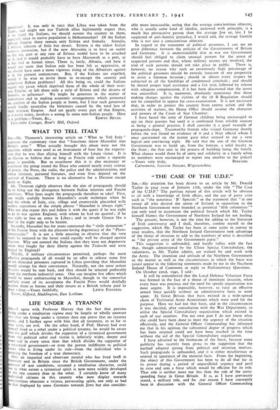WHAT TO TELL ITALY SIR,—Mr. Thomson's interesting article on What
to Tell Italy " expresses the customary view that " Sanctions threw Mussolini into Hitler's arms " What actually brought this about were not the sanctions which were used as an instrument of hate but the expecta- tion that he was thus allying himself with the future victor. It is an illusion to believe that so long as Fascist rule exists a separate peace is possible. But to overthrow this it is also necessary to overthrow the group round the Duce who control nearly every avenue of power, the Press, the radio, the police and the administration, and whose interests, personal fortunes, and even lives depend on the survival of Fascism. There is no alternative for a Dictator except death or flight.
Mr. Thomson rightly observes that the aim of propaganda should be to bring out the divergence between Italian interests and Fascist ambitions. What lines ought the propaganda therefore to take? First, one might usefully borrow Mussolini's crude technique when he had the whole of Italy, city, village and countryside placarded with endless repetitions of the simple phrase " Mussolini is always right." Why not also repeat this and follow it with the query if he was right to go to war against England, with whom he had no quarrel ; if he was right to lose an army in Libya; and to invade Greece like a thief in the night only to be beaten.
Secondly, Mussolini has for years contrasted the " virile dynamism " of the Fascist State with the pleasure-loving degeneracy of the " Pluto- democracies." It is not a little amusing to observe that the very faults he imputed to the latter could equally well be charged against Fascism. Why not remind the Italians that they were not degenerate when they fought for their liberty against the Tedeschi and were helped by England?
Thirdly, if military circumstances permitted, perhaps the most effective propaganda of all would be an offer to release some five or ten thousand prisoners captured in Libya providing that Mussolini would arrange for their conveyance. Naturally, not the most ardent Fascists would be sent back, and they should be selected preferably from the northern industrial areas. One can imagine few offers which mid be more embarrassing to Mussolini, though in the somewhat unlikely event of its acceptance the Fascist Press would dutifully claim them as heroes and their return as a British tribute paid to eir valour.—Yours faithfully, LEWIS EINSTEIN. Yester, Gifford, Haddington, East Lothian.






























 Previous page
Previous page